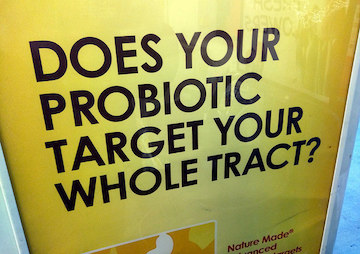Probiotic Goods Are a ‘Waste of Money’ for Healthy Adults, Research Suggests
In a review of existing studies, Danish scientists found no evidence that probiotics, which have a significant market in the U.S., change the composition of bacteria in the guts of healthy people. An ad promoting a probiotic product. (Cory Doctorow / CC BY-SA 2.0)
An ad promoting a probiotic product. (Cory Doctorow / CC BY-SA 2.0)
An ad promoting a probiotic product. (Cory Doctorow / CC BY-SA 2.0)
In a review of existing studies, Danish scientists found no evidence that probiotics, which have a significant market in the U.S., change the composition of bacteria in the guts of healthy adults.
“Probiotics,” explains Guardian reporter Damien Gayle, “are live microbial food ingredients – sometimes labelled ‘friendly bacteria’ – that are said to provide the consumer with numerous health benefits by improving the intestinal microbial balance.”
“They are often made by introducing live bacterial cultures to everyday foodstuffs, which metabolise sugars as they multiply and leave them with a sour, fresh flavour. Aside from branded products specifically marketed as probiotic supplements, such foods include plain yoghurt, sauerkraut, miso and kefir.”
Gayle continues:
Online blogs and magazines have helped spur a trend for lacto-fermentation of foodstuffs by touting a range of purported health benefits, such as improved digestion and resistance to infections.
Oluf Pedersen, who led the research at the University of Copenhagen, said: “While there is some evidence from previous reviews that probiotic interventions may benefit those with disease-associated imbalances of the gut microbiota, there is little evidence of an effect in healthy individuals.” …
… when Pedersen and his team reviewed seven randomised controlled studies that investigated whether a daily probiotic supplement had any effect on the microbial composition of healthy adults’ faeces, only one showed significant changes.
Nadja Buus Kristensen, a PhD student and junior author of the study, said: “According to our systematic review, no convincing evidence exists for consistent effects of examined probiotics on faecal microbiota composition in healthy adults, despite probiotic products being consumed to a large extent by the general population.”
Studies included in the review had sample sizes ranging from 21 to 81, and included participants aged 19 to 88 years old. The Copenhagen team noted that the real impact of the probiotics may have been masked by small sample sizes and the use of different strains of bacteria and variations in participants’ diets, among other factors.
Pedersen said: “To explore the potential of probiotics to contribute to disease prevention in healthy people there is a major need for much larger, carefully designed and carefully conducted clinical trials.
The review is a reminder that these products are marketed and sold to us by capitalists, that is, by people whose first interest is in our money, not our health.
—Posted by Alexander Reed Kelly.
Your support matters…Independent journalism is under threat and overshadowed by heavily funded mainstream media.
You can help level the playing field. Become a member.
Your tax-deductible contribution keeps us digging beneath the headlines to give you thought-provoking, investigative reporting and analysis that unearths what's really happening- without compromise.
Give today to support our courageous, independent journalists.






You need to be a supporter to comment.
There are currently no responses to this article.
Be the first to respond.